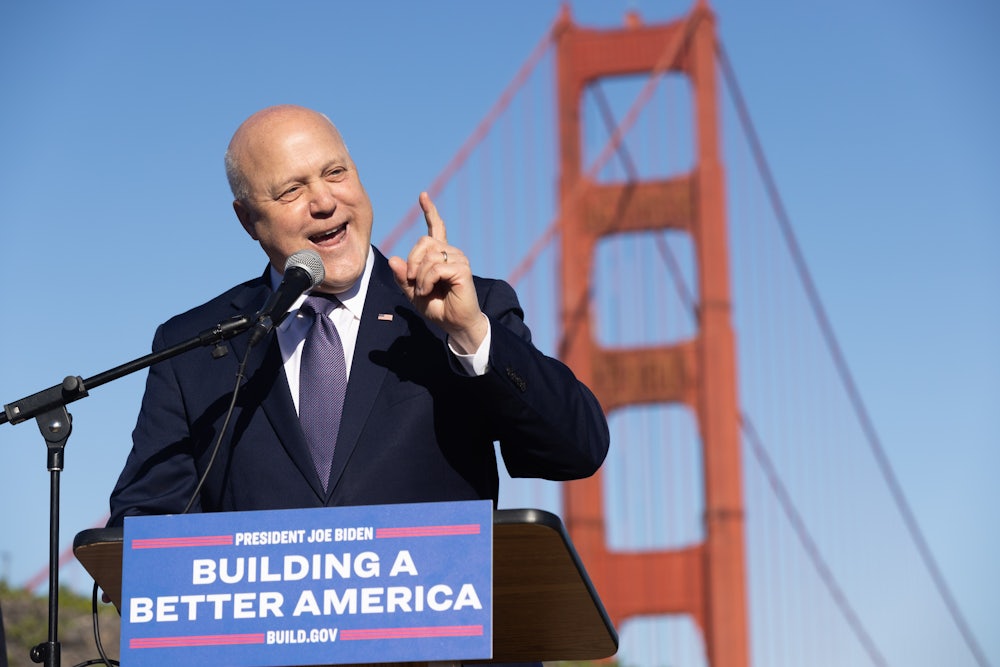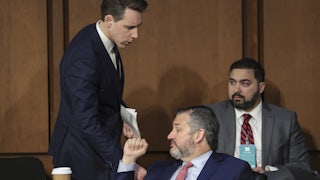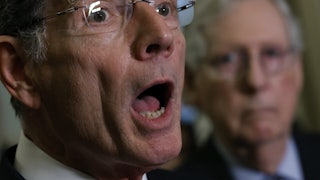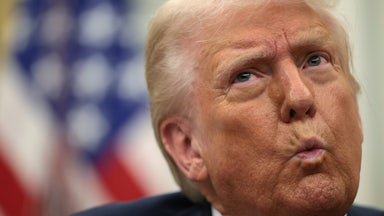On a sunny day in early January, Joe Biden and Mitch McConnell met at the Senate Republican leader’s home in Kentucky to celebrate. Biden and McConnell aren’t exactly archenemies, but it’s rare that the world knows about their hangout sessions. This time was different. The occasion was special to McConnell: the completion of a much-needed $3.6 billion infrastructure project to repair the ailing Brent Spence Bridge and build a companion bridge linking Cincinnati to Covington, Kentucky.
The funding for the project was part of Biden’s $1.2 trillion Infrastructure Investment and Jobs Act, or IIJA, aimed at improving roads, bridges, airports, ports, and waterways, introducing high-speed internet to homes that previously didn’t have it, and setting up electric vehicle charging stations across the country. The Brent Spence Bridge project was one of thousands the Biden administration is implementing across the country.
A lot hangs on this law and these projects as Biden prepares to run for reelection. Can he show jaded voters that the government can do stuff with efficiency? By November 2024, the president might have a number of completed projects he can point to—the Brent Spence Bridge prominent among them—as proof of his accomplishments. Or the landscape could be cluttered with half-done jobs that will be fodder for his opponent. The stakes are high.
Democrats know this. Across the country, signs have been showing up that credit Biden with infrastructure improvements. At the recent House Democratic retreat, mock-ups of such signs circulated among attendees.
At the center of this process is former New Orleans Mayor Mitch Landrieu, the Biden administration’s infrastructure czar. Landrieu’s office is the central hub for coordinating infrastructure projects. He works with Commerce Secretary Gina Raimondo and Biden senior adviser John Podesta, whose portfolios have respective ties to Landrieu’s, on granting funding for projects across the country.
“When the president called me, one of my jobs was to help figure out how to get the money to the ground and try to get the projects out of the ground,” Landrieu explained. “So my team is basically doing three things—and everything falls into these three things: one, building a team. Two, getting the money out the door. And three, telling a story.”
According to Landrieu, in just over the last year, $200 billion has been divvied out through over 20,000 projects and awards in all 50 states and U.S. territories. That includes starting repairs to more than 69,000 miles of roadway, 500,000 electric vehicle charging stations, 3,700 bridge repair and replacement projects, and awards of over 5,000 clean transit school buses. The IIJA also is meant to approve state plans for water funding and high-speed internet deployment. This is no easy task. It’s a huge undertaking to get all 50 states to get infrastructure plans to Landrieu and his team and then for the team to approve them.
The difficulty of completing projects varies. Asked about difficult projects versus easier ones, Landrieu said in every category of project there are easy projects and hard ones. He described a hypothetical example of a difficult project: a highway that would split a predominately African American community into two.
“Now you’re into some conflict and controversy,” Landrieu said in describing that example. There were others: highways that go through multiple states and require dealing with interstate agreements. “The Hudson Tunnel for example,” he said, referring to a new rail tunnel to join New York and New Jersey to help deal with the backups that occur there. “A massive project for the Northeast corridor. But it implicates two states. You’ve got a lot of different organizations that are involved in that. A lot of different players. So it requires a lot of time and a lot of effort.”
Biden is expected to travel the country to highlight infrastructure projects that his administration has begun or completed. But there’s a rub to all this. Many of the projects—and the overall effort—won’t be felt for years, even decades. “You’re rebuilding the whole country,” Landrieu said. “So you’re in a five-, seven-, 10-, 15-year rebuild. But think of it this way: For the past 50 years, nobody’s done anything about it. The money was not there. You finally are putting the money in place and learning how to do these big things and catching up on a backlog that’s been with us for a very, very long time. Some of these things will come out of the ground ASAP. Some of them are huge projects that are going to take years to build.”
That’s the reality of any massive infrastructure undertaking—it spans administrations. “There’s an urge to demonstrate progress, to show that the law has delivered value, but infrastructure projects … take years—even in good circumstances—to construct,” said Adie Tomer, a senior fellow at the Brookings Institution’s Metropolitan Infrastructure Initiative.
Infrastructure experts point to a few other challenges. There are questions about whether there will be enough skilled labor to accomplish all the projects. There are also environmental protections the Biden administration doesn’t want to violate in implementing the improvements, which can seriously slow things down.
Democrats are eager to point out that while Republicans have criticized the law, they’ve also eagerly taken the funding. Biden himself has needled Republicans on that. Down-ticket Democrats like Liz Mathis, who challenged Congresswoman Ashley Hinson in Iowa, criticized the Iowa congresswoman for saying in a statement that she had a hand in the bipartisan bill to make “essential upgrades” to the state’s infrastructure. Hinson opposed the bill.
It’s understandable why everyone would want to take credit for the law. There’s little recent polling on Biden’s implementation of the IIJA, but when the bill was making its way through Congress, there was broad support. Landrieu points to that polling and the recent midterm elections as a sign that voters know Democrats are behind the infrastructure improvements.
“There is a myth out there that people don’t know we’re doing this.… The reason you know it’s a myth is because we talked a lot about this during the campaign and a lot of people saw what we did and basically said ‘I want more of that,’” Landrieu said. “We also have people that voted against this bill taking credit for all the work that’s been done, and they wouldn’t do that if nobody else knew what was going on.”
It’s possible that if Biden loses, the next administration would come in and cut the funding for the infrastructure improvements. “The law extends until 2026, which means some funds will be distributed by whoever is in office in the beginning of 2025,” said Yonah Freemark, a senior research associate at the Urban Institute. “So it is quite possible that you could have up to 20 percent of funds allocated by an administration with very different views of the world.”
But Landrieu sounded confident that that’s unlikely to happen. “That would be about as foolish as trying to gut Social Security,” Landrieu said. “I haven’t had one elected official in this country from all the way over on the left to all the way over on the right, as far as you can go … call me and say, ‘I really don’t want clean water in my district,’ or, ‘I really don’t want indoor plumbing,’ or, ‘I really don’t want high-speed internet,’ or, ‘I really don’t want a bridge,’ or ‘I really don’t need this investment. So could you please take it back?’ Not one.”
As he eyes reelection, Biden is looking to create a larger economic narrative about his time in office. The Biden administration has overseen more public investment than any president going all the way back to Lyndon Johnson or, arguably, Franklin Delano Roosevelt. But that’s only half the battle for the sitting president. He also needs Americans to recognize that his administration did this and did it well, regardless of who else takes credit. Biden’s reelection prospects will partially or maybe even largely depend on how well he tells that story.






